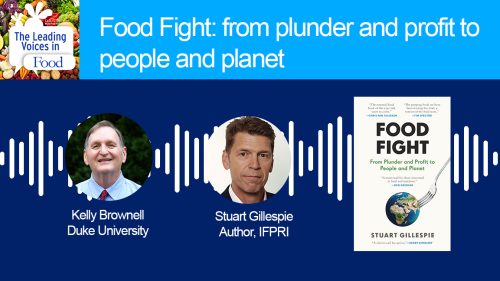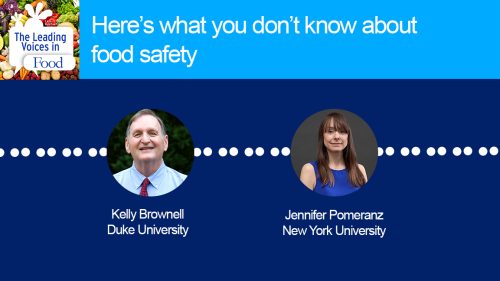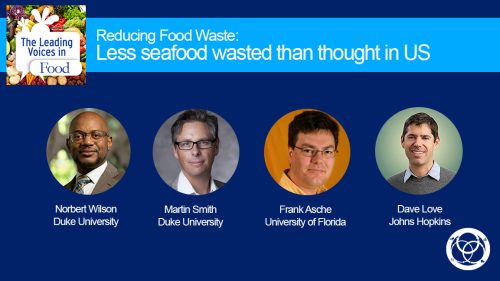The Leading Voices in Food
E17: Cheryl Queen on Corporate Responsibility and Power in the Food Industry
Imagine working for a company that serves more than 5 billion meals worldwide every year. Balancing what people like to eat with corporate goals of promoting health, sustainability, and fair labor practices. Explore these ideas with Leading Voices in Food guest Cheryl Queen of Compass Group North America.
Subscribe: Apple Podcasts | TuneIN | YouTube Music | SoundCloud | PocketCasts | Radio Public
Tags: Food Industry Behavior & Marketing | Food Safety & Food Defense |

Cheryl Queen is the vice president of communication and corporate affairs at Compass Group North America. Compass Group is the largest food and support services company in North America with 2017 annual revenue of more than $17 million and 265,000 employees. Cheryl is deeply involved in food and farming issues. She served as chairman of the Board of advisors for the Center for Environmental Farming Systems. She is a member of the Farm Foundation Roundtable; serves on the board of directors with the Global Animal Partnership; serves on the board of directors of the Fair Food Standards Council; and was recognized for her work in helping craft a code of conduct for suppliers and an agreement to pay farm workers a premium with the Cesar Estrada Chavez award.
Interview Summary
Let’s begin with putting the work of the Compass Group in some kind of a context. So the Compass Group is an enormous global enterprise. Can you explain a bit more about what this work is?
Sure. So when people ask me what Compass Group does, I often try to make it very personal by saying anytime that you are not eating in your own kitchen or dining room, you might be dining with us, and you wouldn’t even have any reason to realize that. Compass Group North America has 28 different companies under that big Compass Group umbrella. And we feed people in every sort of setting you can imagine from schools, colleges, and universities to corporate dining to wonderful like sports and entertainment venues, cultural museums and performing arts centers, hospitals, senior dining, any place you can imagine having a meal outside your home. That’s what we do.
How can a company of this size with this buying power, for example, affect food systems and food policies?
Well, you know, we realized that we actually have enormous power because of the volume that we purchase, and because of the number of guests we serve every day. In North America alone we serve more than I think nine point 8 million meals a day. So what an enormous opportunity to impact the choices that people have and that all begins as a supply chain, you know, of what you purchased and how you purchase that drives them to that end goal of offering our guests healthy, nutritious, better for you, choices every day.
To give us some concrete examples of that, could it affect the welfare of the animals that are being raised or the nutrition of the foods or how to? How do you specifically think about that supply chain being affected by the buying power?
Well, it absolutely affects each one of those that you named and I’ll start with farm animal welfare, because we’ve had the opportunity to lead in some change in that space, and try to move to a system that allows farm animals to experience better health and a healthier life and we believe that translates to our guest. And there’s that sort of bigger piece that’s important to some people about the life that the animal has while they’re here on this earth. It’s that sentient being. So we started with cage-free eggs and making our purchase of cage-free shell eggs important throughout our whole supply chain. The power of Compass Group is that our purchases are so large, Kelly, that when we go all in, and we say we’re going to make this purchase impact all of all these 28 companies it’s pretty significant.
We moved all of our shell egg purchases to cage-free. We’re now in the process of making what’s truthfully a much larger change. And that’s to making our liquid eggs cage free for instance. It is challenging work all across the way, but we think it’s important, you know, our guests have become informed and engaged consumers who want to know where their food comes from and that starts at that, you know, local farm level and that whole movement that we’ve seen in the last 10, 15 years. For a lot of our guests that piece around farm animal welfare is very important. That’s what drives a lot of that change.
You were mentioning that your guests have an interest in knowing more about really the story of their food, if you will. Where it comes from, how the animals might be treated, the vitality of the farmers, who are growing the food and things like that. How do you communicate that to your guests when you have such an enormous scope of operations?
Yeah. It’s interesting. We’re working very hard right now on a particularly telling that story of farm workers with the Coalition of Immokalee workers, and it’s finding, you know, all those points along the way. Starting with our own employees, we employ 265,000 people. That’s a really big group of people who have an engagement with this and helping them understand that story both for their own personal use and in communicating with our guests, sharing that information and then talking to our guests about it. And it’s, you know, all those ways you can communicate it, with signage and a cafe. It’s through videos, through websites. It’s through use of technology of saying this is what we’re doing, we think it’s important to you, and we want to share that message with you of why we’re doing it. Maybe you never thought about who harvests those winter tomatoes in Florida that you’re eating, the conditions under which that happens and these enormous changes that have been made in the field through our work with the Coalition of Immokalee Workers. But we think once you know that it will drive further appreciation of your food, how that whole system work. We find that, but a lot of guests really do, and they feel good about their engagement with us. So, it’s an important story to tell, and we’re always trying to find that unique creative way that engages our guests.
Could you talk a little bit more detail about the farmworker issues and how you were engaged with that?
I would love to because this has been for me personally the most fulfilling work I think I’ve done in my career. Ten, 12 years ago when we started thinking of like sustainable agriculture, I think like most organizations and most consumers we thought about the farmer and local farms and, but for some reason, we never thought beyond the farmer into the actual farm worker. And when we, when the Coalition of Immokalee workers reached out to us and engaged us in a conversation, it was very, and I think it would be eye-opening to most people today to understand some of the issues in agriculture that farm workers and harvesters faces. Most of them are migrant workers. They traveled from farm to farm. Are the growing seasons change? They are very vulnerable for the most part, in that space, they often most often are not from the US. English is not their first language, so they’re vulnerable to be taken advantage of. For women, in particular, there is oftentimes sexual harassment and sexual assault. And it’s, I think it would be surprising.
In Immokalee, which is where the winter tomatoes are grown, the Department of Justice called it Ground Zero for modern day slavery. And the first time I heard modern-day slavery, I thought, well, you know, that’s, that’s quite an accusation, and I’m sure conditions are hard, but that’s, that’s unbelievable. But actually, some people were, being by any definition in slaved and there have been, I think eight or nine successfully prosecuted federal cases of modern-day slavery where people who are serving time in federal prison. So what this whole piece of the Coalition of Immokalee farmworkers did was say, let’s change that system. It doesn’t have to be this way. And they used the power of consumers to help drive that change so that a number of fast food companies, grocery stores that, that we’d be all be familiar with, and companies such as ours signed a code of conduct that said to growers: if you grow tomatoes for us, we expect them to be done under these conditions where it involves safety and training and education. And made it a healthier and smarter work environment for the workers. And also to pay them a penny a pound for tomatoes grown for us, which may sound so small to us, but for farm workers could be a 63 percent pay increase.
The success of that model has been extraordinary. It’s been recognized by the United Nations, by the White House, by the Robert F. Kennedy Center for Human Rights by the James Beard Foundation because it has changed that whole model for worker engagement and work in the agricultural fields. And, it’s now moving beyond tomatoes and Florida to other crops in other locations across the US and expanding. And we’re incredibly proud of the work that we’ve done with the Coalition. And it is a story that is very moving and engages across our organization particularly for our chefs who now visit Immokalee, who’ve come to know the worker and understand the issue and create recipes that give them an opportunity to tell the story.
You’ve been involved on the cutting edge of a number some very important issues. So let’s see if you could provide us your crystal ball for the last question. I’d like to ask, what do you see as some of the key issues going forward with, with farming, with food systems and with a company like Compass Group? What do you think the future will bring?
Well, I think there’s so much more work to be done. When we talk about a food system that is essentially broken in lots of different ways, and I think there are organizations and people who are making differences in this space. You know, I think that we have to move from more intensive farming, both for the environment and for our own health and for the health of land and farmers and farming communities. And so there’s a fellow in Georgia–Bluffton, Georgia named will Harris, who is the owner of White Oak Pastures and he does the most amazing work in this space. And I think it’s someone like that who can be a role model to other farmers who want to work in more sustainable practices. One of the things that I often hear when we talk about the food system is that we have a whole generation who didn’t learn to cook at home.
And I look at people like Matthew Wadiac of Blue Apron and other subscription type services who are, who have created a fun and engaging way to let people learn how to cook and have the confidence of producing a great meal at home. That’s delicious. That takes about 30 minutes. It doesn’t require every gadget. It doesn’t require a chef-approved kitchen. But they have confidence and appreciation now in being able to cook for themselves. And that’s important. I look at people like Josh Tetrick of JustFoods who’s now, who had this idea to apply the innovation and the technology of Silicon Valley to provide healthy and accessible and affordable food for everyone. So he started improbably with a mayonnaise product, just Mayo that eliminated eggs, the basis of mayonnaise but he’s used pea protein in its place, and he’s now growing his line of products, including one just egg.
It makes absolutely delicious scrambled eggs, French toast, anywhere you’d use the liquid egg, but it’s all made from plants. No animals. Allowing us to put more focus in that plant-based diet, which I think we all recognize this healthier. There’s Dr. Uma Valeti who is a Mayo Clinic-trained cardiologist who saw firsthand the impact that that typical American diet is having on his patients. So a true entrepreneur at heart, I think as well as a physician, he founded this company called Memphis Meat in 2015, and it’s about making be more sustainable in delicious, but eliminating the impact of meat production on the environment and providing a healthier choice. All of these points of light along the way are going to be at the forefront of making a change in the food system and making it easier for companies like Compass Group to continue to be at the forefront in bringing these opportunities to our guests.






